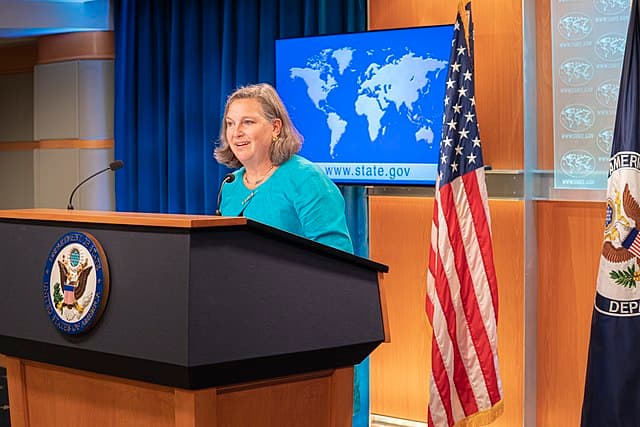Undersecretary Nuland Visits Athens, With Ukraine on the Agenda
She was first received by the Greek prime minister, Kyriakos Mitsotakis, and then met with Greece’s foreign minister, Nikos Dendias.

ATHENS — Springtime in the Greek capital spells orange blossoms in the smoggy air and gaggles of tourists gawking at the Acropolis, but don’t count on the American undersecretary of state to have much time for sightseeing during her stopover at Athens as part of an official week-long trip to Europe.
According to the State Department, the purpose of Undersecretary Victoria Nuland’s travel this week to France, Germany, Turkey, Cyprus, and Greece is “to further strengthen our bilateral relationships, emphasize our unified support for Ukraine, and coordinate on our response to the Russian Federation’s unprovoked war.”
Greek daily Kathimerini reported that Ms. Nuland was first received today by the Greek prime minister, Kyriakos Mitsotakis, and then met with Greece’s foreign minister, Nikos Dendias. She was accompanied by officials from the State Department as well as the Pentagon.
Russian aggression and how to effectively respond to it was high on the agenda at those meetings as well as a subsequent one attended by Ms. Nuland, the U.S. ambassador to Greece, Geoffrey Pyatt, and high-ranking Greek defense officials. Greek news site Iefimerida reported that mutually beneficial armament programs were discussed as were developments in Ukraine, the importance of providing all possible support to the country, and the protection of its territorial integrity, sovereignty, and independence.
On Sunday, Mr. Dendias visited Odessa — on the same day that Russian missiles struck targets outside the key Ukrainian port city, causing damage to critical infrastructure and prompting the British prime minister, Boris Johnson, to tell ministers that he wants to arm Ukraine with anti-ship missiles to fend off Russian bombardment of Odessa.
According to a report in the Times of London, Britain considers that city the next target of Vladimir Putin’s invasion.
That day, Mr. Dendias was in Odessa “to reiterate the support of the Greek government and to manifest the close relation we have with Odessa, its past, and may I express the hope, with its future,” according to a Greek foreign ministry statement.
Greece’s ties with Odessa run deep. The strategic port city happens to be the home of the Filiki Etairia, or Society of Friends, the revolutionary secret society created by Greek merchants in 1814 that hatched the plan to toss out the Ottoman Turks from southeast Europe and establish an independent Greek state.
Mr. Dendias said Russian strikes had not damaged the historic building. There is a sizable ethnic Greek community in both Odessa and besieged Mariupol, where Greece has spearheaded efforts for humanitarian assistance despite what has been to date only scant and sporadic cooperation from Russia.
A long-serving career diplomat, Ms. Nuland has demonstrated that she has strong opinions on Ukrainian politics. While serving under President Obama, Ms. Nuland was the State Department’s point person on Ukraine during that country’s Maidan Revolution in 2014.
In a widely publicized leaked phone conversation in February of that year, she specifically told Geoffrey Pyatt — at the time, serving as the American ambassador to Ukraine — who she thought should become the next Ukrainian prime minister in a unity government with Viktor Yanukovych, then president of Ukraine. He was subsequently thrown out of office.
That phone conversation, the veracity of which Ms. Nuland has acknowledged, could be seen as evidence of proactive diplomacy by some but be construed by others as interference in Ukraine’s fractious politics.
Consider the assessment of a Russian political scientist, Yevgeny Mikhailov, quoted today by the pro-Kremlin Tsargrad TV in the context of Ukraine’s current negotiating positions: “Moscow could no longer put up with the threat to its national security. The United States, together with its Western partners, turned Ukraine into a kind of ram that was supposed to hit Russia.”
The undersecretary’s European tour comes at a time of heightened military tension as well as cooperation. The Greek newspaper Kathimerini reports that Russian warships are constantly on the move between the north Aegean Sea and Russian bases in Syria, and that NATO is actively monitoring them, with American participation, from a navigation corridor that starts off the coast of the Greek island of Crete.
Greek and American fighter jets flew over the city of Athens today as part of a military exercise that also involved armed forces units from countries including France, Italy, and Israel. Athenians craned their necks to see two Greek F-4s, two Greek F-16s, a Greek Mirage-2000-5, one U.S. F-15, a U.S. F-18, and an Italian Tornado jet roaring over the Acropolis in V formation.

